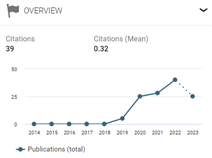Hubungan kebiasaan sarapan dan konsumsi fast food dengan status gizi pada remaja di Sukoharjo, Jawa Tengah
DOI: 10.30867/gikes.v6i2.2798Abstract
Background: Adolescence requires balanced nutrition. Therefore, the role of nutrition in this period is crucial to pay attention to. Breakfast is important for everyone, especially adolescents, before starting daily activities, as 20–25% of the energy requirements can be fulfilled by breakfast. Individuals who are not accustomed to breakfast tend to experience excessive hunger during the afternoon and evening, which leads to the consumption of low-nutrient, energy-dense foods and fast food, ultimately affecting their nutritional status.
Objective: This study aimed to analyze the relationship between breakfast habits, fast food consumption, and nutritional status among adolescents in State Senior High School 2 Sukoharjo.
Methods: This study employed an observational cross-sectional design. The study subjects were 77 eleventh-grade students of State Senior High School 2 Sukoharjo, Sukoharjo Regency, Central Java, selected through proportional random sampling. The research instruments included anthropometric measurements, a 7-day breakfast habit questionnaire, and a Food Frequency Questionnaire (FFQ). Data were analyzed using Spearman’s rank correlation test.
Results: There was a significant relationship between breakfast habits (p = 0.019; r = -0,267) and the frequency of fast food consumption (p = 0.002; r = 0,344) and the nutritional status of adolescents. Breakfast habits and frequency of fast food consumption were found to influence the nutritional status of adolescents.
Conclusion: These findings highlight the importance of promoting regular breakfast habits and healthy eating patterns to improve and maintain adolescent health.
Keywords
Full Text:
PDFReferences
(Riskesdas), R. K. D. N. (2018). Hasil Utama Riskesdas 2018. Badan Penelitian dan Pengembangan Kesehatan Kementrian Kesehatan RI.
(WHO), W. H. O. (2022). Adolescent Health. World Health Organization. Adolescence is The Phase of Life Between Childhood and Adulthood, from Ages 10 to 19. Internet. https://www.who.int/health-topics/adolescent-health/setting-standards-for-adolescent-care#tab=tab_1.
Ardeshirlarijani, E., Namazi, N., Jabbari, M., Zeinali, M., Gerami, H., Jalili, R. B., Larijani, B., & Azadbakht, L. (2019). The link between breakfast skipping and overweigh/obesity in children and adolescents: a meta-analysis of observational studies. Journal of Diabetes and Metabolic Disorders, 18(2), 657–664. https://doi.org/10.1007/s40200-019-00446-7
Arista, C. N., Gifari, N., Nuzrina, R., Sitoayu, L., & Purwara, L. (2021). Perilaku Makan, Kebiasaan Sarapan, Pengetahuan Gizi Dan Status Gizi Pada Remaja Sma Di Jakarta. Jurnal Pangan Kesehatan Dan Gizi Universitas Binawan, 2(1), 1–15. https://doi.org/10.54771/jakagi.v2i1.206
Aulia, S. G. B., Makmur, T., & Hamid, A. H. (2018). Perilaku Konsumsi Fast Food Mahasiswa Fakultas Pertanian Universitas. Jurnal Ilmiah Mahasiswa, 3(1), 130–139.
Bargiota, A., Delizona, M., Tsitouras, A., & Koukoulis, G. N. (2013). Eating habits and factors affecting food choice of adolescents living in rural areas. Hormones, 12(2), 246–253. https://doi.org/10.14310/horm.2002.1408
Bede, F., Cumber, S. N., Nkfusai, C. N., Venyuy, M. A., Ijang, Y. P., Wepngong, E. N., & Kien, A. T. N. (2020). Dietary habits and nutritional status of medical school students: The case of three state universities in cameroon. Pan African Medical Journal, 35, 1–10. https://doi.org/10.11604/pamj.2020.35.15.18818
Bohara, S. S., Thapa, K., Bhatt, L. D., Dhami, S. S., & Wagle, S. (2021). Determinants of Junk Food Consumption Among Adolescents in Pokhara Valley, Nepal. Frontiers in Nutrition, 8(April), 1–9. https://doi.org/10.3389/fnut.2021.644650
Dian, H. (2020). Hubungan Kebiasaan Makan dengan Status Gizi pada Remaja SMP YLPI Pekanbaru. Medika HUtama, 2(1), 332–342.
Dyah IP, Endang NW, E. S. (2019). Peran Gizi dalam Sikulus Hidup Manusia. Surakarta: mup.
Faridi, A., Vidyarini, A., & Prasetya, A. Y. (2023). Hubungan Pengetahuan, Kebiasaan Sarapan Dan Asupan Zat Gizi Makro Sarapan Dengan Status Gizi Pada Remaja. Jurnal Riset Gizi, 11(2), 106–113. https://doi.org/10.31983/jrg.v11i2.10615
Fitria, Khoirunnisa, S., & Furqon, M. (2024). Hubungan Antara Aktivitas Fisik dan Konsumsi Fast Food dengan Status Gizi Siswa di SMK Al-Hidayah Jakarta Selatan. Muhammadiyah Journal of Nutrition and Food Science (MJNF), 5(1), 22–28. https://doi.org/10.24853/mjnf.5.1.22-28
H, F. (2000). Faktor-faktor yang berhubungan dengan konsumsi fast food waralaba modern dan traditional pada remaja siswi SMU Negeri di Jakarta Selatan. Institut pertanian Bogor.
Haldar, P., James, A., & Negi, U. (2023). Breakfast Eating Habits and Its Influence on Nutritional Status. Journal of Health and Allied Sciences NU, 0–3. https://doi.org/10.1055/s-0043-1777021
Hanum, T. S. L., Dewi, A. P., & Erwin. (2009). Hubungan Antara Pengetahuan Dan Kebiasaan Mengkonsumsi Fast Food Dengan Status Gizi Pada Remaja. Jurnal Online Mahasiswa, 2(1), 750–758.
Jessie VS, O. C. (2024). Hubungan kebiasaan sarapan dengan status gizi pada siswa-siswi SMA Bunda Mulia Jakarta (Vol. 11, Issue 6).
Kementerian Kesehatan RI (Kemenkes RI). (2022). Sarapan Pagi Penting bagi Kecukupan Gizi Anak Remaja. Ingternet. https://yankes.kemkes.go.id/view_artikel/1302/sarapan-pagi-penting-bagi-kecukupan-gizi-anak-remaja
Khan, S., Abbas, A., Ali, I., Arshad, R., Burhan Khan Tareen, M., & Ilyas Shah, M. (2019). Prevalence of overweight and obesity and lifestyle assessment among school-going children of Multan, Pakistan. Isra Med J. |, 11(4), 230–233.
Lugina, W., Maywati, S., & Neni, N. (2021). Hubungan Aktivitas Fisik, Asupan Energi, Dan Sarapan Pagi Dengan Kejadian Overweight Pada Siswa Sma Tasikmalaya Tahun 2020. Jurnal Kesehatan Komunitas Indonesia, 17(2), 305–313. https://doi.org/10.37058/jkki.v17i2.3889
Mardalena, I. (2017). Dasar-dasar ilmu gizi dalam keperawatan konsep dan penerapan pada asuhan keperawatan. Yogyakarta: Pustaka Baru Press; 2017.
Mayangsari, A. R. (2017). HUBUNGAN AKTIVITAS FISIK, DURASI TIDUR, KEBIASAAN SARAPAN DAN KEBIASAAN MAKAN CEPAT SAJI DENGAN KEJADIAN GIZI LEBIH DI SDS KARTIKA VIII-5 JAKARTA KELAS 4 DAN 5 TAHUN 2017. Journal GEEJ, 7(2), 1–18. http://www.joi.isoss.net/PDFs/Vol-7-no-2-2021/03_J_ISOSS_7_2.pdf
Nicklas, T. A., O???Neil, C., & Myers, L. (2004). The Importance of Breakfast Consumption to Nutrition of Children, Adolescents, and Young Adults. Nutrition Today, 39(1), 30–39. https://doi.org/10.1097/00017285-200401000-00009
Niswah, I., Damanik, M. R. M., & Ekawidyani, K. R. (2014). Kebiasaan Sarapan, Status Gizi, dan Kualitas Hidup Remaja SMP Bosowa Bina Insani Bogor. Jurnal Gizi Dan Pangan, 9(10), 97–102.
Noviyanti, R. D., & Kusudaryati, D. P. D. (2018). Hubungan Kebiasaan Sarapan Pagi Dengan Prestasi Belajar Siswa SD Muhammadiyah Program Khusus Surakarta. Profesi (Profesional Islam) : Media Publikasi Penelitian, 16(1), 72. https://doi.org/10.26576/profesi.302
Olatona, F. A., Oloruntola, O., Adeniyi, O., & Amu, E. (2022). Association Between Breakfast Consumption and Anthropometrically Determined Nutritional Status of Secondary-School Adolescents in Lagos, Southwest Nigeria. International Journal of Maternal and Child Health and AIDS (IJMA), 11(1). https://doi.org/10.21106/ijma.503
Pamelia, I. (2018). PERILAKU KONSUMSI MAKANAN CEPAT SAJI PADA REMAJA DAN DAMPAKNYA BAGI KESEHATAN. IKESMA, 14(2), 144. https://doi.org/10.19184/ikesma.v14i2.10459
Patarru, F., Situngkir, R. S., Heumasse, C. F., & Ahudara, C. G. S. (2022). Kebiasaan Konsumsi Makanan Siap Saji (Fast Food) dan Status Gizi pada Remaja. Jurnal Penelitian Kesehatan Suara Forikes, 13(3), 234–237.
Purwanti, S., & Shoufiah, R. (2017). Kebiasaan Sarapan Pagi Mempengaruhi Status Gizi Remaja Jurusan Kebidanan, Politeknik Kesehatan Kemenkes Kalimantan Timur. Politeknik Kesehatan Kemenkes Kaltim, 09, 81–87.
Putri, L. N. (2014). Hubungan Pola Konsumsi Fast Food Dengan Kejadian Overweight Pada Remaja Putri Sma Batik 1 Surakarta. Jurnal Kesehatan.
Rahmat, I. (2022). Pengaruh pendidikan ibu dengan status gizi siswa di SMK Bina Sehat Nusantara Kabupaten Bone tahun 2022. Suara Kesehatan, 8(1), 1–6.
RI), K. K. R. (Kemenkes. (2023). Pengaruh makanan cepat saji terhadap kesehatan remaja. Internet.
Rohmah, M. H., Rohmawati, N., & Sulistiyani, S. (2020). Hubungan kebiasaan sarapan dan jajan dengan status gizi remaja di Sekolah Menengah Pertama Negeri 14 Jember. Ilmu Gizi Indonesia, 4(1), 39. https://doi.org/10.35842/ilgi.v4i1.155
Rosida, H. (2018). Hubungan Kebiasaan Sarapan, Tingkat Kecukupan Energi Dan Gizi Makro Dengan Status Gizi Pada Siswa Pondok Pesantren Al-Fattah Buduran, Sidoarjo. Media Gizi Indonesia, 12(2), 116. https://doi.org/10.20473/mgi.v12i2.116-122
Saintila, J., Carranza-Cubas, S. P., Santamaria-Acosta, O. F. A., Serpa-Barrientos, A., Ramos-Vera, C., López-López, E., Geraldo-Campos, L. A., & Calizaya-Milla, Y. E. (2024). Breakfast consumption, saturated fat intake, and body mass index among medical and non-medical students: a cross-sectional analysis. Scientific Reports, 14(1), 1–11. https://doi.org/10.1038/s41598-024-63440-x
Saputra, A., & Kartika, W. (2023). Pengaruh Sarapan Pagi Terhadap Status Gizi Remaja di SMA Negeri 1 Ciomas. Jurnal Ilmiah Kesehatan, 2(1), 50–54.
Sari, A. F. I., Briawan, D., & Dwiriani, C. M. (2016). KEBIASAAN DAN KUALITAS SARAPAN PADA SISWI REMAJA DI KABUPATEN BOGOR. Jurnal Gizi Dan Pangan, 7(2), 97. https://doi.org/10.25182/jgp.2012.7.2.97-102
Saufani, I. A., Desmaneni, F., Hanum, F. N., Mohammad, U., & Bukittingi, N. (2022). Hubungan Konsumsi Fast Food dengan Status Gizi Siswa Sekolah Menengah Kejuruan. Afiyah, IX NO. 1(1), 4.
Sulistyowati, Y., Ariestanti, Y., Widayati, T., Magister Ilmu Kesehatan Masyarakat, P., & Ilmu, P. D. (2019). Hubungan Konsumsi Fast Food dengan Kejadian Gizi Lebih pada Remaja di Perkotaan. Jurnal Kesehatan Masyarakat, 3(1), 83–89.
Sutrisno, Diana Cahyaning Pratiwi, Istiqomah, Kristianus Jaha Baba, Lutfi Ema Rifani, M. A. N. (2018). Sosialisasi Hiv Atau Aids Dalam Kehamilan Di Rt 27 Rw 10 Lingkungan Tirtoudan Kelurahan Tosaren Kecamatan Pesantren Kota Kediri. Journal of Community Engagement in Health, 1(1), 14–16. https://doi.org/10.30994/10.30994/vol1iss1pp16
Usdeka Muliani, Sumardilah, D. S., & Mindo Lupiana. (2023). Asupan Gizi Dan Pengetahuan Dengan Status Gizi Remaja Putri. Cendekia Medika: Jurnal Stikes Al-Ma`arif Baturaja, 8(1), 35–42. https://doi.org/10.52235/cendekiamedika.v8i1.202
Wulandari, A. (2014). Karakteristik Pertumbuhan Perkembangan Remaja dan Implikasinya Terhadap Masalah Kesehatan dan Keperawatannya. Jurnal Keperawatan Anak, 2, 39–43.
Yun, Y.-J., Kwon, Y.-J., Lee, Y., Heo, S.-J., & Lee, J.-W. (2024). Association of dietary habits with general and abdominal obesity in Korean children and adolescents: cluster analysis of nationwide population survey data. Frontiers in Endocrinology, 15(September), 1–9. https://doi.org/10.3389/fendo.2024.1424761
Refbacks
- There are currently no refbacks.













